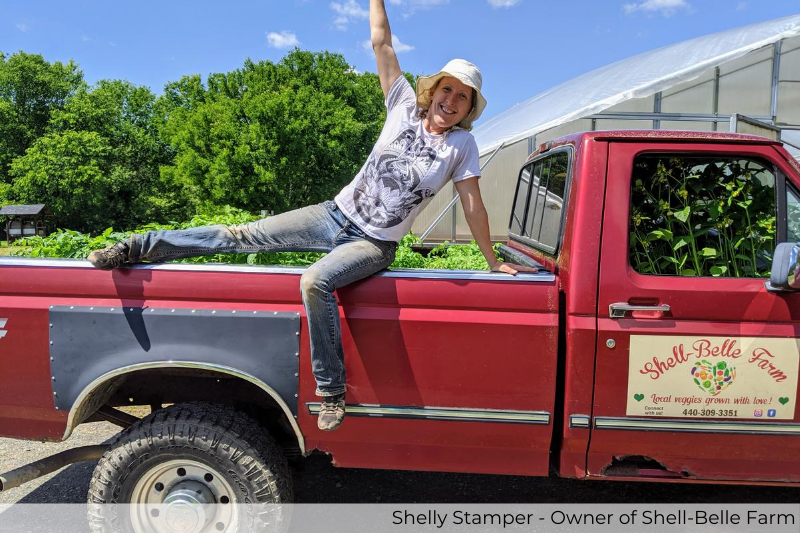by Rachel Clark, CFSA Development Director | Thursday, July 23, 2020 –
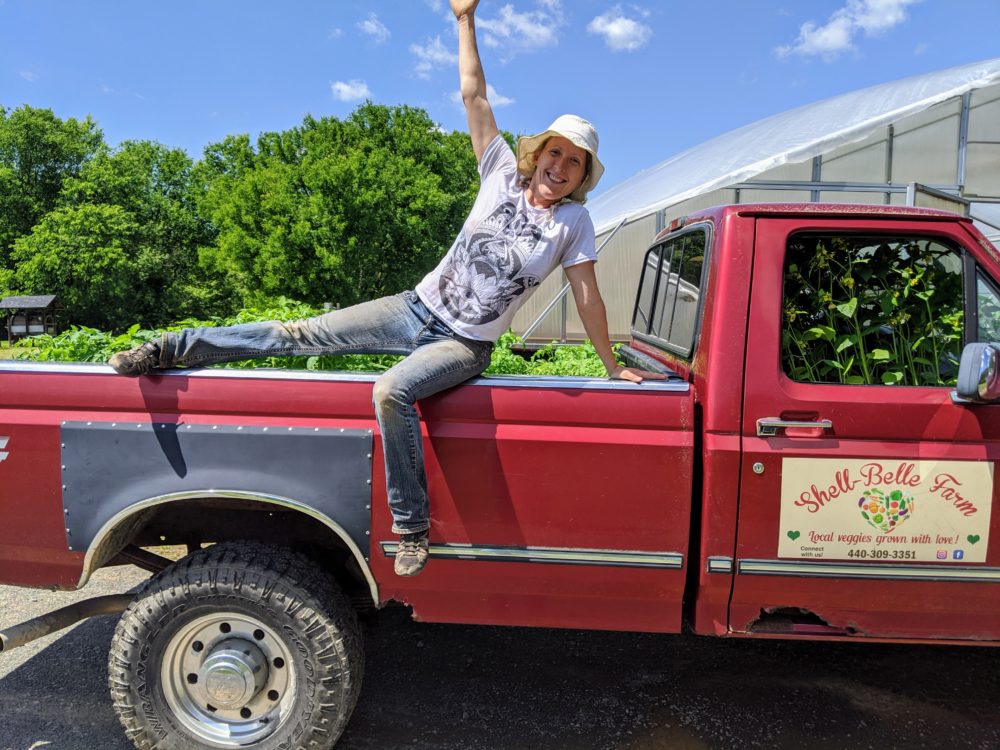
Since her introduction to CFSA’s Lomax Education & Research Farm in 2017, Shelly Stamper has been an integral part of the Lomax community. During her first year farming, Shelly leased land at Lomax and enrolled in the Farmer-in-Training (FiT) program. Her year as a FiT provided a low-risk, educational environment for Shelly to fully immerse herself in agriculture and start her own business surrounded by a supportive, experienced farming community.
Years later, Shelly owns and operates Shell-Belle Farm and still utilizes the greenhouse at Lomax. She currently plays an active role in several Lomax initiatives including those that are swiftly responding to the COVID-19 pandemic.
We had the opportunity to virtually sit down with Shelly for an interview in April.
CFSA: Without a doubt, we’re living in a wild time right now. First and foremost, how are you?
Shelly Stamper: It’s a roller coaster ride, but I believe that being aware of your emotions and them going up and down is totally normal at this time. This morning I was washing the dishes and had all these thoughts about what I had to do, everything that’s happened so far, and what’s going to happen in the future. And I had a cry over the sink. I just had to let that stuff go.
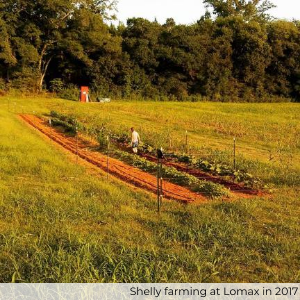
We get caught up in thinking that we have to get all this stuff done and live up to these expectations, and most of the time those expectations are ones that we set for ourselves. But during this time—when you’re dealing with these new things—you have to give yourself that space to be okay with messing up or not getting something done.
We’re all in it together – that’s the piece of it that keeps me grounded. It’s not just me or my family or a close friend; it’s all of us. We’re all trying to find ways to adapt.
CFSA: You own and operate Shell-Belle Farm. Can you tell us about the farm, how you got started, what you grow, etc.?
Stamper: I was in the restaurant industry for a better part of my life. I’m 33 now, but ever since I was a kid, I’ve really enjoyed cooking. I’d always be in the kitchen with my mom watching her cook with my grandparents. I come from an Italian family so I learned how to make homemade tomato sauce basically when I was just big enough to say “tomato.” My family had a couple of small gardens, but it’s funny, I really wasn’t interested in plants at all then. I just wanted to play, ride the four-wheeler, and that sort of thing.
I went to a vocational school for culinary arts for 11th and 12th grade in high school and went to college at Johnson and Wales in 2006, which brought me to North Carolina. Through the years, I have been a chef, a line cook, a dishwasher, a server—you name it. I was a jack of all trades in that industry for a long time. But I got burned out after working 65 hours a week, every holiday and birthday, since my birthday is on New Year’s Eve. Eventually, it caught up with me. I went through a huge state of depression for three or four years where I felt I didn’t have any direction or purpose. I was working all night, getting home at 2 a.m., sleeping until 1 p.m., taking a shower, and doing it all over again.
I come from an Italian family so I learned how to make homemade tomato sauce basically when I was just big enough to say “tomato.”
One day, I was scrolling through Facebook and came across a video by David Young of Capstone Community Gardens and Orchard in the 9th Ward of New Orleans where he converts an abandoned building into a greenhouse. He teaches people how to grow their own food in this food desert that was devastated by the hurricane. Watching that made me sit up out of bed and say to myself, “I want to grow food for people.”
Around that same time, a friend introduced me to Lynn McDougal Flemming. Lynn has a ‘farmette’ with a high tunnel and an acre and a half or so of land. She has helped me immensely. Lynn is one of those go-getters. I’m a thinker—I have to make sense of these things, stack a list up, overthink if something’s going to work, meanwhile, Lynn goes, “let’s just try it!” She’s actually the one who got me connected to Lomax.
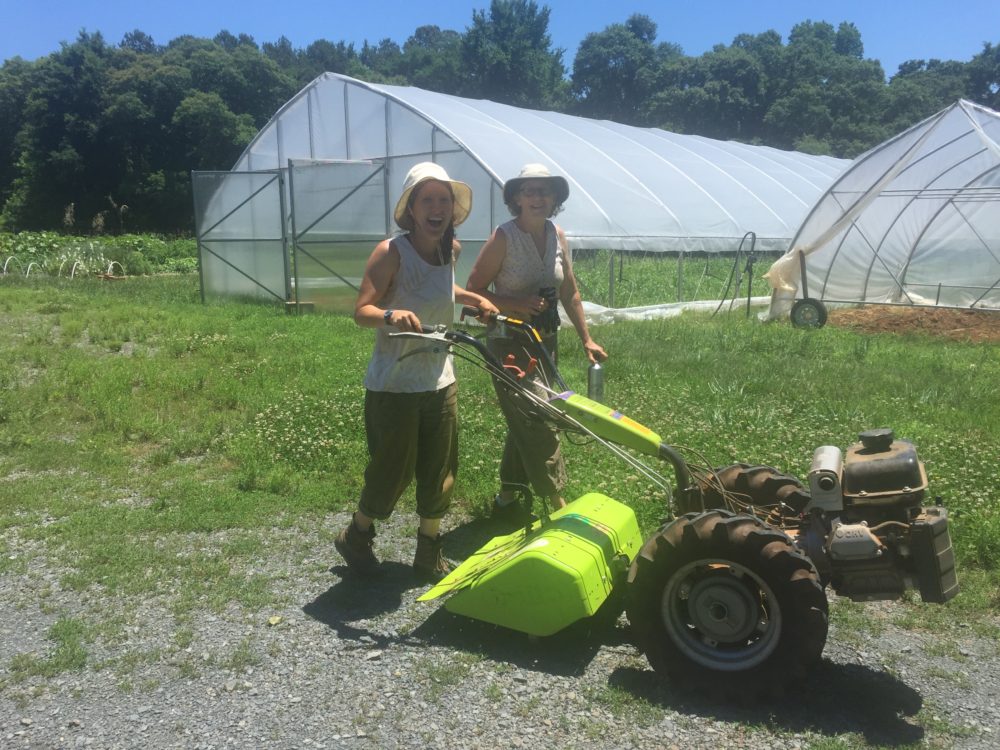
CFSA: Can you tell us a bit more about the journey from your first visit with Lynn to owning your own operation?
Stamper: I worked with Lynn from 2016 until 2019. She’s still very involved with helping me but not right now; she’s 65 and is in quarantine to stay safe.
I officially became the sole-proprietor of Shell-Belle Farm in 2017 and have been growing at Lomax with Lynn for the past two years.
I recently moved to Mount Pleasant, where we’re about to break ground for the first time. Shell-Belle Farm’s wings have spread to an actual location, and we’re going to give our first season a go there this season.
I’m really careful on how I go about this farming thing. I’d rather go slow and steady, and not bite off too much, than tackle acres and acres. My intention is to be a small-scale farmer. I want to do a homesteading type of blueprint to help folks that are interested in starting gardens at home or who want to see what it’s like to have a homestead. We’re starting with a quarter-acre patch this year. We’re getting ready for the May 1st planting, mostly tomatoes and peppers. We’re also going to do canary melons and some herbs. I’d really love to have a lavender patch out there; I’ve always wanted to grow lavender.
I’m really careful on how I go about this farming thing. I’d rather go slow and steady, and not bite off too much, than tackle acres and acres.
This is the first official year where I have gone out on my own and started making all of these decisions by myself. Just spreading my wings and jumping out of the nest.
CFSA: How has this pandemic affected your business?
Stamper: I got my first taste of what a COVID-19 market about two weeks ago. I usually stop (going to) market around November and start again in the spring. This is my third year as a vendor at the Piedmont Farmers Market in Concord. Normally, when I’ve been gone for that long and come back, it’s like a family reunion. You see all the vendors you haven’t seen in a while—your buddies throughout the summer—and the customers you haven’t seen in months. Normally we’re hugging, laughing, and talking about our holidays. But man, that first weekend back, I felt so sad. The whole vibe was completely different. I love hugging people, so maintaining six feet distance was really hard for me. You want to run up to those people you haven’t seen in forever and give them a hug, and I had a hard time adjusting to that come the first Saturday morning. It felt like I was in a zombie apocalypse. It just felt really low and quiet. You could feel the fear, the concern in the air. It was a big adjustment.
I was walking around my house the following week brainstorming. I decided to wear my pirate hat from the Renaissance festival with my bandana mask. Kind of like an element of comic relief. I got a lot of compliments on the hat!
CFSA: How do you feel business was this year compared to your first two weeks at the farmers market last year?
Stamper: That first Saturday was a little slow going, which isn’t uncommon for me since those first few weekends I’m usually there with just plants to sell. Right now it seems like the food is more popular. We are beginning to have a harvest come in at Lomax, so that helps a lot. Last weekend was good. People seemed, for the most part, to maintain their distance while they were waiting in line. I’m happy to still see people showing up at the market.
CFSA: How have you pivoted your business in response to the COVID-19 pandemic?
Stamper: The emergence of COVID-19 birthed the idea of selling the plants online. At the farmers market, Ben Street of Street Fare Farm said, “you know Shelly, you can create an online store if you want. Maybe you can sell the plants that way?” I didn’t know how to do something like that!
It took me about two weeks. It took some creativity and really sitting down and choosing how to arrange things—like putting puzzle pieces together. While I tend to learn quickly, every once in a while I’d start pulling my hair out when I couldn’t figure something out, but there was always a Youtube video or something to help.
The first two weeks were incredible. I launched the website and had four orders placed within 12 hours. I don’t like spending a lot of time on my phone and social media, but it’s very helpful right now. I’ve used social media to advertise. I’ve used Facebook Live and Instagram Live, none of which had I done before, but these times have changed the way we communicate. You can sit there and be sad or you can go “okay, how can I take advantage of this new technology to promote my business?”
We’ve sold almost 700 plants on the website.
I owe much of my success to my friends and connections on Facebook, who spread the word like wildfire—sharing my posts, sharing that the website even exists. I owe thanks to all of them. If it wasn’t for an awesome network of friends and family, people wouldn’t have even known (my website) was there. I can’t even put into words how grateful I feel.
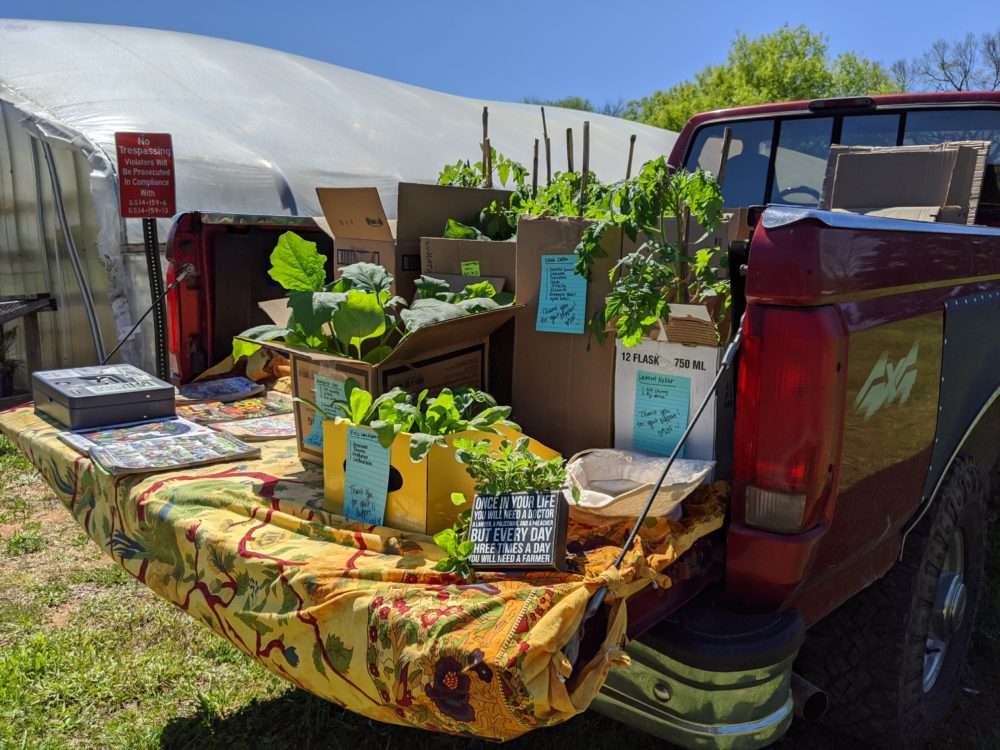
CFSA: You’ve been involved at Lomax in a few ways. Can you walk us through how you were first introduced to Lomax and the ways that you’ve been involved since?
Stamper: I was introduced to Aaron Newton, the former Lomax Farm Manager in 2016. Before I officially signed a lease for the 2018 season and became an official Farmer inTraining (FiT), the farm team let me play around in one of the plots.
I currently help with the research plots at Lomax and help to maintain and care for the food-for-donation plots.
CFSA: Can you talk about the impact that your time as a FiT at Lomax had on your path?
Stamper: That first year, I realized I had a lot to learn. Because of the scale that Lomax offers, you’re really upgrading. I learned a lot about the different aspects of farming, and it helped me to hone in on what direction I wanted to take. Meeting some of my farm mentors was very pivotal for my farming adventure.
For the most part during that year, I was out there by myself, learning and getting the chance to make mistakes and find successes.
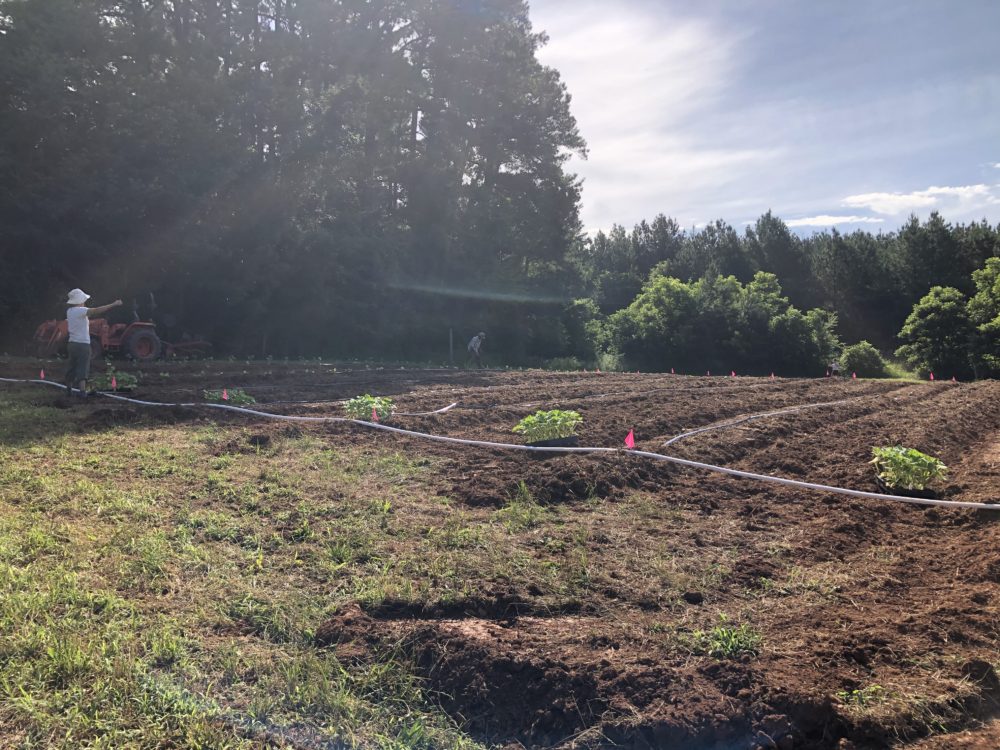
CFSA: What is something that Cabarrus County and surrounding citizens should know about Lomax?
Stamper: Lomax is a really important piece to getting the word out about how important farming is.
I think the farm is really taking off with education, especially connecting schoolchildren with farming. There are kids out there that aren’t aware that food doesn’t just come from the grocery store—that it grows in a field by someone that works hours and hours. Lomax usually does tours with nearby schools throughout each school year. It really helps bring awareness to young people that may be interested in where food comes from. I think Lomax will be really important as that awareness grows, and the farm can grow with our community—literally and figuratively—to spread the word of how important that is.
CFSA: In your opinion, why should folks support Lomax?
Stamper: What’s going to be given to Lomax will be shared back out to the community—it’s a circular relationship. We are all connected. We all live in this community together, so why not know who your farmers are and where your food comes from? Donations would definitely help Lomax to continue to grow, expand, and find new ways to get that word out. There will only be a growing interest in where our food comes from, and Lomax can continue to create an amazing place for folks, like me, who want to expand their knowledge and be a part of something that matters.
I consider the people here at Lomax to be my family, and we work together to help each other when we need it. It’s not just about farming, it is about supporting each other.
“What’s going to be given to Lomax will be shared back out to the community”
Lomax, to me, brings that comfort of farming with friends and also feeling like I’m part of a family. I really think it’s important to share that with others. For me, my family is mostly in Ohio. Maybe there are people in this community that feel a little lonely or lost? What better way to get them involved with a fun community and a feeling of family than coming out to Lomax and getting involved. There are so many positive things to it. I can’t think of a single negative thought. It’s 100% worth it if you invest in this idea.
You can follow Shelly Stamper’s farming adventures on Facebook and Instagram.
Photos courtesy of CFSA and Shelly Stamper.


